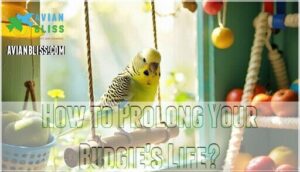This site is supported by our readers. We may earn a commission, at no cost to you, if you purchase through links.

The main culprits behind a budgie suddenly dying are hidden illnesses, stress, toxic fumes (think scented candles or cleaning sprays), or a diet mishap.
Even a drafty window or a nibble of avocado can knock a budgie off its perch.
Don’t feel guilty—it’s sadly common, and your feathered friend’s cheerful song may have masked warning signs.
Next up, you’ll uncover the sneaky dangers, surprising causes, and the smartest ways to keep your next budgie chirping strong.
Table Of Contents
- Key Takeaways
- Causes of Sudden Budgie Death
- My Baby Budgie Died Suddenly
- Why Your Budgie Died With Eyes Open
- Can Budgies Die of Loneliness?
- How to Keep a Budgie Alive
- How Long Do Budgies Live?
- Why Do Budgies Die Suddenly?
- How to Prolong Your Budgie’s Life?
- Frequently Asked Questions (FAQs)
- What age do most budgies die?
- Can budgies have heart attacks?
- What are some common signs of illness in budgies?
- Can budgies die from being lonely?
- How can I prolong my budgie’s life?
- What is the average lifespan of a budgie?
- What should I do immediately after my budgie dies?
- Can surviving budgies sense or grieve a loss?
- Are there genetic health issues in some budgie lines?
- Could household plants contribute to sudden deaths?
- Conclusion
Key Takeaways
- You can easily miss signs of illness in your budgie—these birds are great at hiding when they’re sick.
- Household toxins like scented candles, cleaning sprays, or certain foods (like avocado or chocolate) can quickly and unexpectedly harm your budgie.
- Sudden changes in diet, stress, or loneliness all play a big part in unexpected budgie deaths.
- Regular vet visits, a balanced diet, and a safe environment are your best defense for keeping your budgie healthy and chirping.
Causes of Sudden Budgie Death
Losing a budgie suddenly isn’t just heartbreaking; it’s confusing, too.
You might be surprised to learn that things like diet, stress, and little household dangers can all play a part in these unexpected losses.
Even the tiniest change in diet, stress, or household safety can lead to heartbreaking, sudden losses for your budgie.
Unhealthy Diets
Seed-heavy diets can be a recipe for trouble.
Budgies on these menus face obesity risks, vitamin deficiencies, and a higher chance of sudden death.
To prevent an unhealthy diet from sneaking up on your feathered friend, aim for dietary balance every day.
Mix in high-quality pellets, skip the toxic foods like chocolate or avocado, and treat seeds as a rare dessert, not the main course.
A balanced diet should include a sufficient amount of vegetables to guarantee they get enough vitamins and minerals.
- Wondering about malnutrition? It’s sneakier than you think!
- Watch for dull feathers and low energy.
- Consult an avian vet for diet tips.
Stress
Spotting stress in your budgie can feel like trying to read tea leaves—sometimes subtle, sometimes obvious.
Environmental Stressors like loud noises, sudden changes, or rearranged cages are big budgie stressors.
Social Isolation and rough Handling Stress can also send feathers flying—literally!
Watch for Stress Symptoms like feather plucking or acting jumpy.
Reducing Stress means sticking to routines, offering companionship, and keeping things calm. Staying on top of these budgie stress factors can help stop stress from leading to sudden budgie death, by addressing key issues like Environmental Stressors.
Airborne Toxins
In the blink of an eye, airborne toxins can turn a happy budgie’s world upside down.
Teflon Poisoning from overheated pans and the Aerosol Dangers of household cleaning agents are serious risks. Even light Smoke Inhalation or Chemical Sensitivity leave budgies reeling.
Good Ventilation is key—crack open a window! Budgie sudden death isn’t rare when toxins lurk.
Keep your space free of budgie airborne toxins, and always ask your vet if you have safety doubts. Budgies are also susceptible to metal poisoning, so keep them away from lead and zinc.
Toxic Foods
Regarding budgie toxic foods, even a little taste can spell big trouble.
Chocolate toxicity, avocado dangers, and onion hazards can quickly lead to poisoning or sudden death.
Caffeine effects are no joke either—one sip and your feathered friend’s heart might race out of control.
Watch for sneaky risks in:
- Chocolate, which causes seizures and heart issues
- Avocado, deadly thanks to persin
- Onions and garlic, which destroy red blood cells
- Caffeinated drinks
Choose safe alternatives, and keep household cleaning agents far away from your budgie’s treats.
Owners should also be wary of Teflon poisoning risks.
My Baby Budgie Died Suddenly
Losing a young budgie can feel like a punch in the gut. Sudden budgie deaths may happen even with the best care.
Sometimes even the tiniest, most cherished budgie leaves us before we’re ready, despite all our love and care.
Budgie health issues show up fast and can be tough to spot.
Pay close attention to budgie illness symptoms and always check the basics:
- Watch for silent budgie dying signs like hunched posture or not eating
- Make certain clean water and food—malfunctioning bottles can be deadly
- Reduce airborne toxins in your home
- Feed a balanced diet, not just seed
- Seek grief support if you need it
Why Your Budgie Died With Eyes Open
After a sudden budgie death, you might see your budgie lying still, eyes wide open. Don’t let the “Open Eyes Meaning” scare you—it’s common.
When birds pass away, their eyelid muscles relax, so the eyes usually stay open. This “Death Stance” isn’t painful or tied to fear. Budgies can go quickly due to budgie health issues or heart attacks, which means no time for eyelids to close.
Here’s a quick glance at what’s happening:
| Budgie Dying Signs | Open Eyes Causes |
|---|---|
| Limp, unresponsive | Muscle Relaxation |
| Abnormal posture | Immediate Cause—stroke |
| Loss of coordination | Rigor Mortis not involved |
| Quiet, glassy stare | Budgie Illness Symptoms |
The table provides a clear overview of the signs and causes related to a budgie’s death, including muscle relaxation and the immediate cause of death, which can be a stroke or other health issues.
Can Budgies Die of Loneliness?
Left alone with little to chirp about, a budgie’s world shrinks and shadows appear.
Budgie loneliness isn’t just sad—it’s risky. Isolation effects sneak up, leading to stress indicators like dull feathers, silence, or even feather plucking.
Without a companion budgie or daily social interaction, these birds can spiral into health decline. Watch for behavioral changes as early warning signs.
Regularly chatting, offering toys, or adding a feathered friend helps meet their social needs and prevent budgie stress or sudden deaths.
How to Keep a Budgie Alive
Keeping your budgie alive and chirpy takes more than luck—it’s about smart budgie care tips. Give your feathery friend an enriched environment where curiosity thrives and boredom fades.
Don’t skimp on preventative healthcare or balanced nutrition. Build a budgie safe environment to dodge dangerous surprises.
Social interaction beats loneliness, while safe housing shields against budgie illnesses. Consider their need for quality budgie seed to guarantee proper nutrition.
- Fresh, clean water daily
- Varied budgie diet (pellets, fruits, veggies)
- Companion or frequent attention
- Toys and space for exercise
- Regular vet checkups for budgie preventive measures to ensure a healthy and happy life with your feathery friend.
How Long Do Budgies Live?
A budgie’s lifespan is like the ticking of a well-tuned clock—steady when cared for, but unpredictable if neglected.
The average lifespan of a pet budgie is about 7–15 years, with some stretching even longer under attentive, loving care.
In the wild, budgies live a rougher life, often reaching just 4–6 years.
Factors influencing budgie lifespan include genetics, diet, exercise, and quality of life.
Giving your budgie room to fly, a balanced diet, and regular interaction can work wonders for extending lifespan.
Old age comes faster without proper geriatric care and vet check-ups.
So, when you spot a bright-eyed budgie, remember:
- Picture a cheerful feathered friend flitting around for many birthdays, thanks to your daily TLC.
Why Do Budgies Die Suddenly?
Even with the best care, budgie sudden deaths can feel like a bolt from the blue.
Hidden illnesses are often to blame—budgies hide symptoms, so by the time you notice something’s wrong, it may be too late.
Environmental hazards also loom large in everyday life; ordinary things like scented candles or overheated pans can be fatal for sensitive little lungs.
Don’t forget about genetic predisposition—sometimes, even a seemingly healthy bird can be dealing with problems under the feathers.
Trauma impact, such as flying into a window or rough handling, can cause unexpected loss in seconds.
Budgie health problems like heart issues or egg binding mightn’t show signs until it’s serious.
Accidental poisoning, such as Teflon cookware exposure, also poses a significant risk.
Preventative measures, like regular vet checks, a clean environment, and watching out for toxins, help reduce the risk of sudden budgie death—even in budgie old age, with a focus on regular vet checks and a clean environment.
How to Prolong Your Budgie’s Life?
It’s one thing to wonder why budgies die suddenly, but helping them live longer is another story.
- Offer superior nutrition with a mix of pellets, fresh veggies, and fruits for a consistent food supply.
- Bring on enrichment activities—lots of toys, perches, and chances to flap those wings.
- Focus on preventative healthcare: watch for changes in mood or appetite and see an avian vet.
Show plenty of social interaction and keep their safe environment clean for a longer budgie lifespan.
Frequently Asked Questions (FAQs)
What age do most budgies die?
Most budgies live around 5 to 8 years, but with great care and some luck, you might see yours hit 10 or even
It’s a bit like rolling the dice at a birthday party!
Can budgies have heart attacks?
Around 10% of sudden parakeet deaths stem from heart issues.
Your feathered friend can have a heart attack, especially if stressed or overweight.
It’s smart to keep life calm, their cage clean, and their treats healthy.
What are some common signs of illness in budgies?
You’ll spot illness if your bird stops eating, sits fluffed up, or acts quieter than usual.
Sneezing, watery droppings, or breathing with effort are red flags.
Don’t wait—see a vet if your budgie seems off.
Can budgies die from being lonely?
If your feathery pal spends too much time alone, stress and sadness can really take a toll.
Loneliness weakens their immune system, lowers their mood, and—left unchecked—can even shorten their life faster than a cold draft.
How can I prolong my budgie’s life?
Back in the Stone Age, your budgie’s life would depend on good vibes.
Keep the cage clean, offer fresh food and water, set regular vet visits, avoid smoke.
Provide toys and a chatty companion.
What is the average lifespan of a budgie?
You’ll find most budgies live about 5 to 10 years with good care.
Treat them well, feed them right, and keep checkups regular—you might just have a chirpy companion around for a full decade!
What should I do immediately after my budgie dies?
Handle your budgie gently, wrap it in a soft cloth, and place it somewhere cool.
Cleaning the cage next helps keep things fresh.
If you’re unsure why it happened, consider calling a vet for guidance.
Can surviving budgies sense or grieve a loss?
Your budgies can definitely sense when one’s missing.
They might call out, look for their friend, or act down.
Be gentle with them, offer extra company, and fresh toys—just like people, they need time to heal.
Are there genetic health issues in some budgie lines?
About 1 in 20 budgies have hereditary health problems, such as tumors or immune issues.
If you’re choosing a new bird, ask for its family history—think of it as picking a feathered friend with a family tree.
Could household plants contribute to sudden deaths?
Some common houseplants can be silent killers for your feathered friend.
Even a nibbled leaf can do real harm.
Before bringing greenery home, double-check if it’s safe for birds—better safe than sorry with these leafy dangers!
Conclusion
Last year, Jamie’s cheerful budgie suddenly died after it nibbled on avocado.
When your budgie suddenly died, you probably didn’t see it coming—many owners don’t.
These little birds can hide illness and react quickly to stress or toxins.
Now you know what signs to watch for and how to prevent sudden loss.
Keep dangerous foods away, watch for subtle signs, and create a safe, happy home.
Your next budgie’s chirp depends on your care and attention.
- https://www.abbey-vetgroup.co.uk/Birds_Medical_Conditions.html
- https://www.featherbeautiful.com/en-us/blogs/news/top-10-health-problems-in-budgies
- https://www.grittypetco.ca/blogs/main-blog/budgie-food-101-diet-tips-for-a-healthy-happy-bird
- https://articles.hepper.com/why-did-my-parakeet-die-suddenly/
- https://www.youtube.com/watch?v=yAWqUFshf0Y








